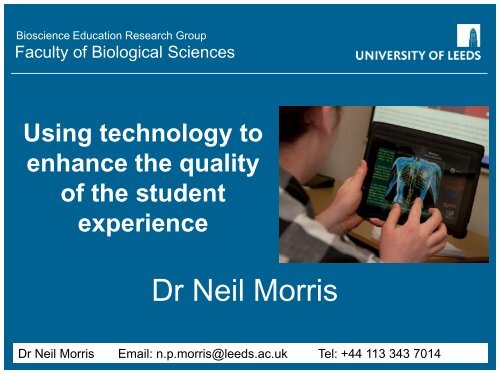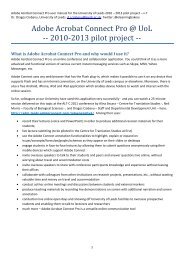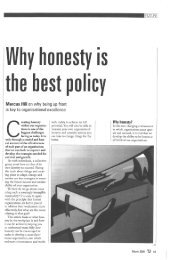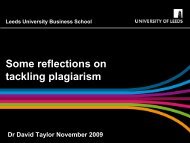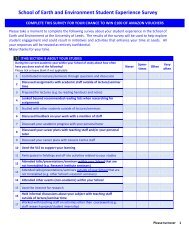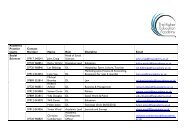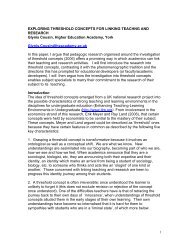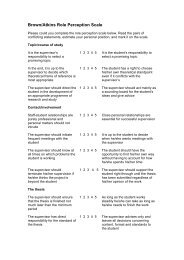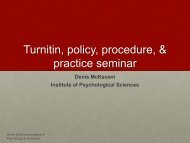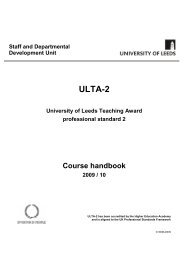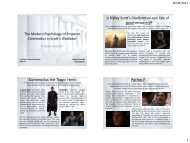The session PowerPoint presentation - University of Leeds
The session PowerPoint presentation - University of Leeds
The session PowerPoint presentation - University of Leeds
Create successful ePaper yourself
Turn your PDF publications into a flip-book with our unique Google optimized e-Paper software.
Bioscience Education Research GroupFaculty <strong>of</strong> Biological SciencesUsing technology toenhance the quality<strong>of</strong> the studentexperienceDr Neil MorrisDr Neil Morris Email: n.p.morris@leeds.ac.uk Tel: +44 113 343 7014
Faculty <strong>of</strong> Biological SciencesInformationretrievalCollaborationInteractionSelfassessmentMultimediaAny time,any placeCreativityIndependentstudySociallearning
Faculty <strong>of</strong> Biological SciencesAudio-visualCollaborationAssessmentInformationPodcastsDiscussionboardseVotinghandsetsInternetLecturecaptureChat toolsQuiz toolsBibliographicsourcesArticulatepresenterSocial mediaFormalonline testingDigitalrepositoriesInteractivewhiteboardWikisMobiledevicesReferencemanagementtoolsMultimediaCloudcomputingMultimediafeedbackNews feeds
Faculty <strong>of</strong> Biological Sciences97% <strong>of</strong> secondaryschool learners haveinternet access at home94% <strong>of</strong> primary schoollearners have internet accessat home81% <strong>of</strong> Y10 secondarystudents know how to uploadvideos, pictures or recordings60% <strong>of</strong> Y10secondary students knowhow to edit a wiki or ablogNational survey <strong>of</strong> primary and secondary school learners in England (2009-10)http://dera.ioe.ac.uk/1555/1/becta_2010_htsslearner_report.pdf
Faculty <strong>of</strong> Biological Sciences
Faculty <strong>of</strong> Biological Sciences
Faculty <strong>of</strong> Biological Sciences
Faculty <strong>of</strong> Biological Sciences30% <strong>of</strong> youngpeople “find it difficult to finduseful information online”25% believed theyshould “use all informationthey found”
Faculty <strong>of</strong> Biological SciencesA current student‟s use <strong>of</strong> technology
Faculty <strong>of</strong> Biological SciencesLuddite: One who opposes technical or technological change
Faculty <strong>of</strong> Biological SciencesAs a university, how do we compare with ourcompetitors when it comes to use <strong>of</strong> educationaltechnology?A. Our use <strong>of</strong> educational technology makes usdistinctiveB. We are ahead is some areas, behind in othersC. We are behind our competitors in all areasD. Us, and all <strong>of</strong> our competitors, are behind in this areaVoting instructions:1. Turn handset on by pressing power button for several seconds.2. Enter join code (two digit number).3. Check for slow flashing green light.4. Enter required answer when voting question is active. All responses are anonymous.
Faculty <strong>of</strong> Biological SciencesTaught classes (face to face)Private studyAssessmentSocial learning
Bioscience Education Research GroupFaculty <strong>of</strong> Biological SciencesAudio recordings andpodcasts
Podcasts can enhanceexamination performanceFaculty <strong>of</strong> Biological Sciences• McKinney D, Dyck JL, Luber ES. iTunes <strong>University</strong> and the classroom: Canpodcasts replace Pr<strong>of</strong>essors? Computers & Education 52: 617-623, 2009.• Morris, N.P. (2010) Podcasts and mobile assessment enhance studentlearning experience and academic performance. Bioscience Education. Vol.16. http://www.bioscience.heacademy.ac.uk/journal/vol16/
Faculty <strong>of</strong> Biological Sciences“Audio recordings <strong>of</strong>the lectures havebeen invaluable to meduring my revision asthey have allowed meto make full notes forrevision purposes, aswell as aiding myunderstanding <strong>of</strong> themore difficult material”
Faculty <strong>of</strong> Biological Sciences
76% haveFaculty <strong>of</strong> Biological listened to Sciencesmorethan half <strong>of</strong> the lecture audio recordingsavailable to themOn average, students listened to audio recordings <strong>of</strong> lecturesTWICE, withover 80%listening to more than half <strong>of</strong> the recording60% happy with the whole,unedited, lecture being posted. 30%would prefer silences etc to be removed73% indicated that the availability <strong>of</strong> lectureaudio recordings does not influence lecture attendance93% indicatedthat lecture audiorecordings had become important/very importantto their study habits94% used recordings to increase understandingand 84%used them to write detailedlecture notes90% indicated that they concentrate more inlectures where audio recordings are provided, as they don‟thave to make so many notes83% <strong>of</strong>students indicated that they thinkall lectures should be provided as an audio recordingn=120 undergraduate students, FBS (Feb 2012; based on Semester 1, 11-12)
Faculty <strong>of</strong> Biological Sciences“I can safely say that having access to these podcasts would have a massive positive impact onour learning, as well as understanding <strong>of</strong> research papers that may have been read previously.Students don't always understand what they are reading and being able to listen the researchertalk about their work will help them to grasp the content.”
Bioscience Education Research GroupFaculty <strong>of</strong> Biological SciencesStudent voting handsetsand lecture capture
Faculty <strong>of</strong> Biological ScienceseVoting handsets (student response systems)• Increase interactivity;• Increase knowledge retention;• Stimulate debate;• Increase engagement;• Offer feedback;• Increase participation in lectures,practicals and tutorials.Kaleta, Robert, and Joosten, Tanya. "Student Response Systems: A <strong>University</strong> <strong>of</strong>Wisconsin System Study <strong>of</strong> Clickers," Educause Center for Applied ResearchResearch Bulletin. Vol. 2007, Issue 10, May 8, 2007, pp. 4–6Beatty, Ian. "Transforming Student Learning with Classroom CommunicationSystems," Educause Center for Applied Research Research Bulletin. Volume2004, Issue 3 (February 3, 2004), p. 5.Using classroom communication systems to support interaction and discussion inlarge class settings by James Boyle & David Nicol -http://www.ph.utexas.edu/~ctalk/bulletin/glasgow2.pdf
Faculty <strong>of</strong> Biological SciencesOne pr<strong>of</strong>essor in FBS teaching firstyearbiochemistry students said:“Simply, it was a great week.Students seem to love the clickerquestions... <strong>The</strong> atmosphere in thelecture theatre was like none I haveexperienced before, with studentstalking to me and working with me,asking questions, and asking forhelp.”Morris, N.P. (2010) Using eVoting handsets in Biological Sciences. Learning and Teaching Bulletin,<strong>University</strong> <strong>of</strong> <strong>Leeds</strong>. Issue 24.
Faculty <strong>of</strong> Biological Sciences
Faculty <strong>of</strong> Biological Sciences„<strong>The</strong> lecturerecordings wereone <strong>of</strong> the mostuseful materials Ihave ever used.‟98% saidrecorded lectureswere very useful fortheir studies/revision(n=122; 2010-11)Total daily views for one recorded lecture.Average <strong>of</strong> 5.8 views per day.
Faculty <strong>of</strong> Biological SciencesGood uses for interactive chat:• Summarise main points• Ask questions• Resolve problems55% said they liked havinginteractive chat; 35% said theyliked having it but they wanted studentsto use it for sensibleDavid T: why does it stoppotassium?maria: how does it blockthe channel? with amolecule or via a proteinshipoopi: whats a hilock ?xxx: are ipsp's used toprevent unwanted ap'soccurring spontaneouslyor just when an ap isoccurring and needs to bestopped?comments/questions; 10% said theydidn‟t like it. (n=107; 2010-11)
Particularly beneficial forFaculty non-native <strong>of</strong> Biological English Scienceslanguage speakers.No detrimental effect onlecture attendanceBeneficial for weakerstudents, who viewrecordingsmultiple timesUseful for high achievingstudents to skipthrough and find keypoints <strong>of</strong> interest.Useful for revisionSynchronised withlearning materialsPopular with studentsand easy to useBollmeier, S. G., Wenger P. J., Forinash A. B. (2011) Impact <strong>of</strong> Online Lecture-capture on Student Outcomes in a <strong>The</strong>rapeutics Course.American Journal <strong>of</strong> Pharmaceutical Education. 74: 127Davis, S.J., Connolly, A., Linfield, E. (2009) Lecture capture: Making the most <strong>of</strong> face to face learning Engineering Education: Journal <strong>of</strong> theHigher Education Academy Engineering Subject Centre 4: 4-13Owston R.; Lupshenyuk D.; Wideman H. (2011) Lecture capture in large undergraduate classes: Student perceptions and academicperformance. Internet and Higher Education. 14: 262-268Shaw G.P.; Molnar D. (2011) Non-native english language speakers benefit most from the use <strong>of</strong> lecture capture in medical school.Biochemistry and Molecular Biology Education. 39: 416-420
Faculty <strong>of</strong> Biological SciencesIf you could choose only one <strong>of</strong> the following forinstitution-wide investment in the next 2 years, whichwould it be?A. iTunesUB. Lecture capture / video conferencing solutionC. Mobile portal/VLE solutionD. Audio/video repository (i.e. LUTube+)E. Student interaction system (i.e. handsets or mobile based)Voting instructions:1. Turn handset on by pressing power button for several seconds.2. Enter join code (two digit number).3. Check for slow flashing green light.4. Enter required answer when voting question is active. All responses are anonymous.
Bioscience Education Research GroupFaculty <strong>of</strong> Biological SciencesSocial learning tools
Faculty <strong>of</strong> Biological Scienceshttp://socialtimes.com/63-<strong>of</strong>-high-school-studentswant-textbooks-thatcommunicate-withclassmatesinfographic_b91711
Faculty <strong>of</strong> Biological Sciences“Many ways <strong>of</strong> learning helped vary how to learn e.g. podcasts, using Twitter,lecture slides, and plenty <strong>of</strong> questions to help us practise each topic. “
Faculty <strong>of</strong> Biological Sciences
Faculty <strong>of</strong> Biological Sciences1181136842
Bioscience Education Research GroupFaculty <strong>of</strong> Biological SciencesEfficient and effectivefeedback
Faculty <strong>of</strong> Biological Sciences“<strong>The</strong> amount <strong>of</strong> additional resources <strong>of</strong>fered was amazing and trulyhelpful in helping me understand the material better.”
Faculty <strong>of</strong> Biological Sciences“<strong>The</strong> materials in the VLE and the feedback providedreally helped me make the most out <strong>of</strong> this module. “
Faculty <strong>of</strong> Biological Sciences
Bioscience Education Research GroupFaculty <strong>of</strong> Biological SciencesStudents‟ use <strong>of</strong> tabletdevices
Faculty <strong>of</strong> Biological Sciences“Revolutionary, this haschanged the way I approacha class, I feel totallyprepared as, I get the lectureslides without having to printthem, take notes , record,reference and if necessarylook things up, all in thepalm <strong>of</strong> my hand... WOW”
3 ½ h Faculty Over <strong>of</strong> Biological Sciences per dayusing device for studyingTop educational apps:SoundnoteDocs To GoiBooksGoodReaderPubmed on TapCoursenotesDropboxDictionaryWikipanion80% thoughtthe iPad wasa useful tool for studying96% foundMorris et al. (2012) Advances in Physiology EducationSignificant in use <strong>of</strong> laptop forstudying after 10 weeks with a tablet deviceSignificant in use <strong>of</strong>:Literature search enginesWikisPodcastsAudio recordingsSignificant in use <strong>of</strong> printed learning resourcesSignificant in word-processingSignificant in use <strong>of</strong> pen and paperSignificant in use <strong>of</strong> emailthe device easy to use
Faculty <strong>of</strong> Biological SciencesHow do you think the <strong>University</strong> should support mobiletechnology in the future?A. Encourage staff and students to use any device, but <strong>of</strong>fer limitedsupport for devicesB. Encourage staff and students to use any device and support alldevices comprehensivelyC. Suggest staff and students use a single device and <strong>of</strong>fer fullsupport for that deviceD. Provide all staff and students with a single managed device andsupport it comprehensivelyVoting instructions:1. Turn handset on by pressing power button for several seconds.2. Enter join code (two digit number).3. Check for slow flashing green light.4. Enter required answer when voting question is active. All responses are anonymous.
Bioscience Education Research GroupFaculty <strong>of</strong> Biological SciencesTechnology integration inpractical settings
Faculty <strong>of</strong> Biological Sciences“I really enjoyed the neuroanatomy practical class as I felt the use <strong>of</strong> iPads cleverly appealed tothe students whilst allowing us to revise in a new and effective ways”.
17% takeFaculty <strong>of</strong> Biological their laptop Sciencesintouniversity more than THREE times a week, eventhough 98% own one.76% felt using tablet devices in apractical class was beneficial to their learning76% used Wikipedia at least TWICE aweek for academic work3D brain app was used for anaverage <strong>of</strong> 16 minutes during the 2 hour class89% usedday for academic worka search engine everyOver70% used all <strong>of</strong> the apps provided on thetablet device during the practical class67% had access to a touch screen devicesuitable tor academic work98% foundthe 3D brain app tobe useful for enhancing their learning during the practicalclassn=115 undergraduate students, FBS (Nov 2011)
Faculty <strong>of</strong> Biological Sciences
Faculty <strong>of</strong> Biological ScienceseBook in action
Faculty <strong>of</strong> Biological SciencesJohnson L, Smith R, Willis H, Levine A, Haywood K. <strong>The</strong> horizon report [Online]. <strong>The</strong> New Media Consortium.http://csn.edu/PDFFiles/OTS/Website documents/getconnected/HR2011.pdf.
Faculty <strong>of</strong> Biological SciencesWhich one <strong>of</strong> these “future” technologies do youthink <strong>of</strong>fers the most potential for HigherEducation?A. Electronic booksB. Mobile devicesC. Augmented realityD. Games based learningVoting instructions:1. Turn handset on by pressing power button for several seconds.2. Enter join code (two digit number).3. Check for slow flashing green light.4. Enter required answer when voting question is active. All responses are anonymous.
Faculty <strong>of</strong> Biological SciencesReferences and acknowledgementsCatherine Bell, Neil Morris, Alina Secara, Steven Sourbron, Aisha Walker, Dragos Ciobanu. (2011) Can onetool change the culture <strong>of</strong> an institution? ALT-C conference, <strong>University</strong> <strong>of</strong> <strong>Leeds</strong>.Morris, N.P. (2007) HEA Centre for Bioscience E-learning Case Study. Blended learning resources for a firstyear neuroscience/pharmacology module – an e-learning practice case study:ftp://www.bioscience.heacademy.ac.uk/Resources/morris.pdfMorris, N.P. (2008) VLE implementation project. Learning and Teaching Bulletin, <strong>University</strong> <strong>of</strong> <strong>Leeds</strong>, Issue18.Morris, N.P. (2010) Podcasts and mobile assessment enhance student learning experience and academicperformance. Bioscience Education. 16:1.Morris, N.P. (2010) Using eVoting handsets in Biological Sciences. Learning and Teaching Bulletin,<strong>University</strong> <strong>of</strong> <strong>Leeds</strong>. Issue 24.Morris, N.P. (2010) Blended learning approaches enhance student academic performance. EnhancingLearning Experiences in Higher Education, Hong Kong <strong>University</strong>. Conference Proceedings:http://www.cetl.hku.hk/conference2010/pdf/Morris.pdfMorris, N. P. (2011) Using Blackboard for Blended Learning Enhances Student Engagement and Learning.Blackboard World Conference, Las Vegas, July 2011.http://blackboard.echo360.com/ess/echo/<strong>presentation</strong>/1a246e1f-faba-4bc6-8fe1-8e4234a4c790Morris N.P., Ramsay, L., Chauhan, V. (2012) Can a tablet device enhance undergraduate science studentsstudy behaviours? Advances in Physiology Education 26.Acknowledgements to all final year project students, student interns and theiPad project <strong>of</strong>ficers who contributed to the work presented in this case study.
Faculty <strong>of</strong> Biological SciencesThank you.Dr Neil Morris Email: n.p.morris@leeds.ac.uk Tel: +44 113 343 7014


